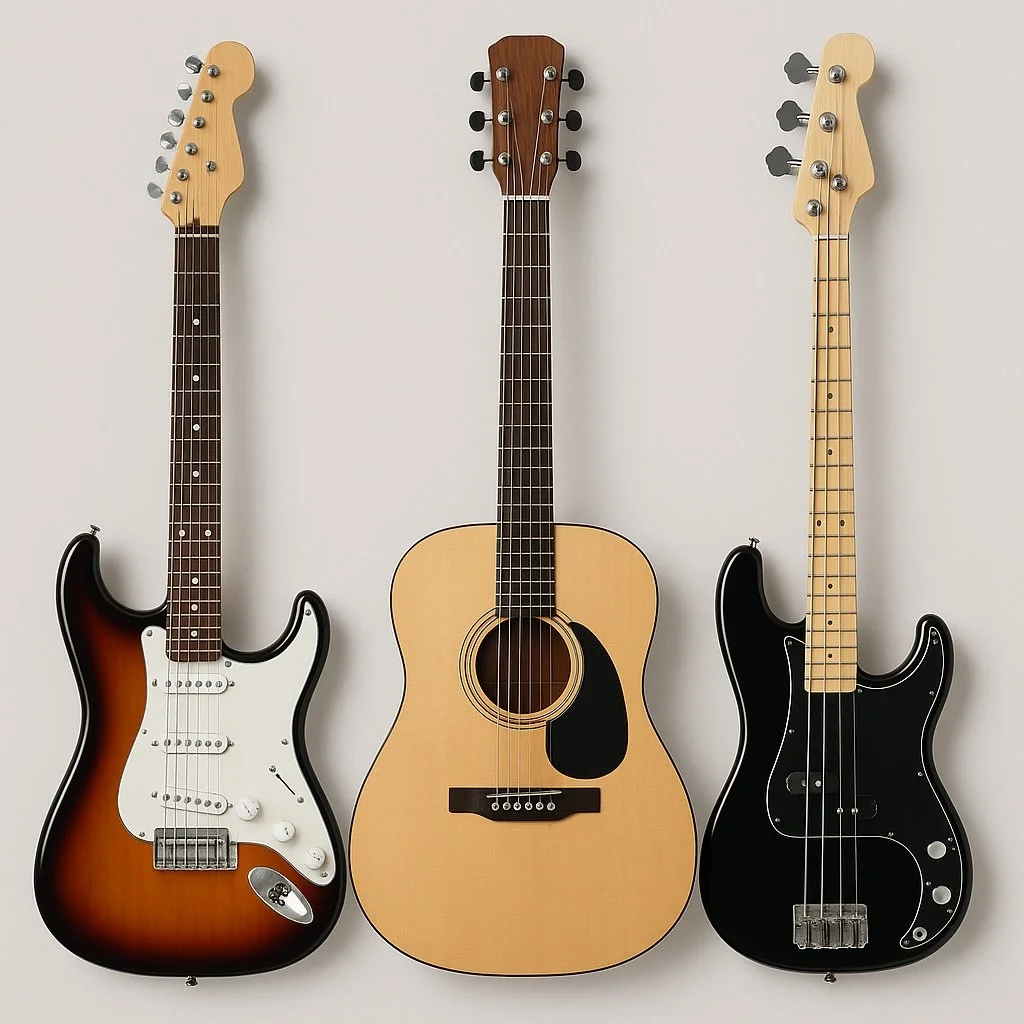Buying Your First Guitar
Simple Guide for New Students
Starting lessons is exciting, but choosing your first guitar, bass, or the bits that go with it can feel confusing. The good news is: you don’t need to spend a fortune. A reliable beginner instrument plus a few accessories is all you need — and you can usually get everything for around £100–£200.
Here’s a simple guide to make it stress-free.
1. Choosing the Instrument
Acoustic Guitar
• Best for: Strumming songs, singer-songwriter styles, and anyone who just wants to grab and play.
• What to look for:
• Smaller body sizes (sometimes called “parlour” or “3/4”) are easier for younger players.
• Nylon-string “classical” guitars are softer on the fingers; steel-strings are brighter and louder.
• Price guide: £90–£150 gets you a good starter acoustic that stays in tune.
Electric Guitar
• Best for: Rock, pop, and students who want to plug in and play with different sounds.
• What to look for:
• A light, comfortable body.
• Simple controls — one or two knobs is fine.
• Price guide: £120–£180 is enough for a solid beginner model. Many come in starter packs with an amp included.
Bass Guitar
• Best for: Students who like rhythm, groove, and playing in bands.
• What to look for:
• A standard 4-string bass.
• “Short-scale” basses are easier for smaller hands.
• Price guide: £150–£200 for a beginner bass, often with a small practice amp in a bundle.
2. Amps (for electric and bass)
Not every beginner needs an amp right away, but they do make learning more fun (and allow headphone practice).
• Electric guitar amps: Small “practice amps” usually cost £50–£80.
• Bass amps: Starter bass amps begin around £80–£100.
• Headphones: Plug in to keep the noise down — any set of over-ear headphones will work.
3. Must-Have Accessories
• Strap: Helps hold the guitar comfortably — about £10.
• Lead (cable): To connect the guitar or bass to the amp — about £10.
• Tuner: A clip-on tuner makes tuning quick and easy — about £10.
• Spare strings: Around £5–£10 a pack. Always good to have.
• Case or gig bag: Keeps the instrument safe on the way to lessons — from £15–£20.
👉 Many starter packs include some of these already, which helps keep the cost down.
4. Where to Buy
• Music shops: Great for trying instruments and getting advice.
• Trusted online stores: e.g. Andertons, GAK, PMT Online, Gear4Music.
• Tip: Avoid toy-shop guitars — they often don’t stay in tune, which makes learning harder and less fun.
5. Beginner Bundles (All-in-One Shopping Lists)
🎸 Acoustic Guitar Setup (approx. £150 total)
• Acoustic guitar: £100–£130
• Clip-on tuner: £10
• Padded gig bag: £20
• Spare strings: £8
• Strap: £10
👉 No amp needed. Simple, portable, and ready to go.
🎸 Electric Guitar Setup (approx. £180–£200 total)
• Electric guitar: £120–£150
• Practice amp (with headphone socket): £50–£70
• Guitar lead (cable): £10
• Strap: £10
• Tuner: £10
• Spare strings: £8
👉 Often available in starter packs (guitar + amp + strap + cable + tuner) for around £180.
🎸 Bass Guitar Setup (approx. £200 total)
• Bass guitar: £150–£180
• Small bass amp: £80–£100
• Bass lead (cable): £10
• Strap: £10
• Tuner: £10
👉 Some starter packs include both bass + amp together, which keeps it simple.
💡 Top Tip for Parents
Starter packs are usually the easiest and cheapest way to get everything at once. Just make sure it’s from a proper music retailer (not a toy shop), so the instrument stays in tune and feels good to play.
🎸 In short: A beginner guitar or bass, a small amp (if needed), and a few simple accessories are all you need to start making music confidently — without breaking the bank.
Contact me.
Ready to start your guitar journey?
Whether you’re a complete beginner, looking to pick up bass, or want to push your playing to the next level — I’d love to help.
Fill out the form below or drop me an email, and I’ll get back to you as soon as possible.
